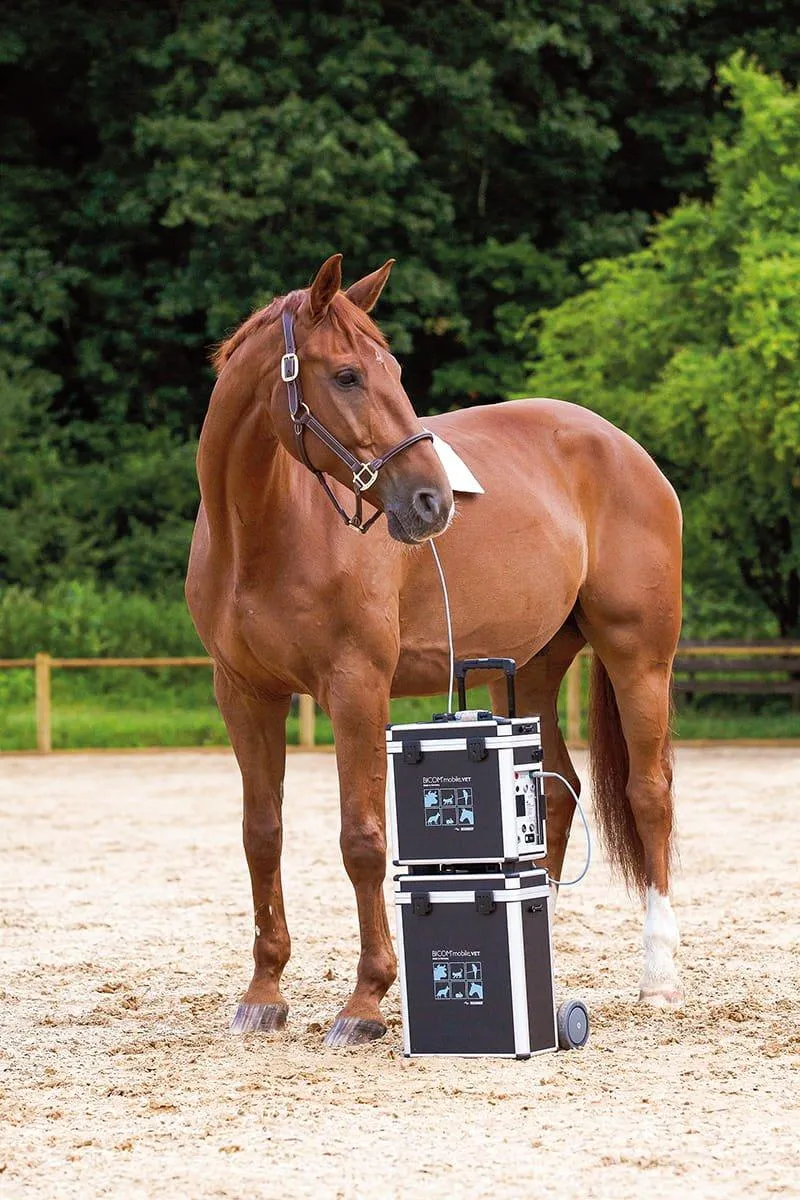Welcome to our veterinary page!
in this section, you can discover what bioresonance therapy is and how it can be a useful tool to enhance your veterinary practice.
Bioresonance therapy is an alternative treatment method that uses electromagnetic frequencies to address imbalances in the body. When applied to animals, it can help to alleviate a range of health conditions by promoting natural healing processes. This non-invasive therapy is gaining popularity among pet owners who are looking for safe and effective ways to support their animal’s well-being. Learn more about bioresonance therapy for animals and how it may benefit your furry friend.
Bioresonance has long been used to identify and target the root cause of a variety of health problems in people. More recently, this technology has also been applied to pets and other animals with much success. BICOM® bioresonance therapy can be used in the treatment of various types of animals, including, Dogs, Cats, Horses, Rodents, Birds and more.
Would you like to know more?
A range of experiences, research and scientific studies into the efficacy of bioresonance treatment can be found on our Blog section. This is where you can view the latest findings and articles about therapy with the BICOM® or browse the article archives.
You can also learn more about the features of the specific devices in the BICOM® range through our therapy machine page. This can help you to see which product will suit you, your clients and your practice best.

Top 5 Common Mistakes Every Owner of Pet Makes
The 5 Common Mistakes Every Owner of Pet Makes and How to Avoid Them
Being an owner of pet is a rewarding experience, but it also comes with a great deal of responsibility. Whether it’s a dog, cat, or another companion animal, taking care of a pet requires time, attention, and the right knowledge. However, despite the best intentions, many pet owners unknowingly make mistakes that can affect their pet's health and well-being.
This article highlights five common mistakes made by pet caregivers and provides guidance on how to avoid them.
Mistake #1: Ignoring Proper Nutrition
Why It Matters
Just like humans, pets require a balanced diet to stay healthy. Many pet owners are unaware of the nutritional needs of their pets, leading to feeding mistakes that can cause long-term health problems. Pets that aren’t provided with the right food can suffer from obesity, malnutrition, digestive issues, and even organ damage.
How to Avoid It
Choose the Right Pet Food: Look for pet food that is appropriate for your pet's age, size, and activity level. High-quality food with balanced nutrients is essential.
Avoid Overfeeding: Many pet caregivers tend to overfeed their pets, either out of love or the assumption that pets need to eat more than they actually do. Follow recommended portion sizes.
Consult a Veterinarian: If you’re unsure about what to feed your pet, always consult a professional. Your vet can recommend specific foods or dietary changes based on your pet’s health.
By providing proper nutrition, you ensure your pet maintains a healthy weight, shiny coat, and high energy levels.
Mistake #2: Neglecting Regular Vet Check-Ups
Why It Matters
Regular vet visits are crucial for your pet’s health. Yet, many pet caregivers skip these appointments, thinking their pet is healthy as long as it looks fine on the surface. In reality, pets can hide symptoms of serious health issues, making it harder for pet owners to catch problems early.
How to Avoid It
Schedule Annual Check-Ups: Even if your pet seems healthy, an annual vet visit is essential for preventive care and early detection of health issues.
Stay Up to Date on Vaccinations: Vaccines are vital for protecting your pet from dangerous diseases. Don’t skip vaccination appointments or boosters.
Ask Questions: During vet visits, make sure to ask questions about your pet’s overall health. Discuss any behavior changes or concerns you’ve noticed.
Regular check-ups are key to maintaining your pet’s health and catching any underlying conditions before they become serious.
Mistake #3: Not Providing Enough Mental and Physical Stimulation
Why It Matters
Pets, especially dogs, require mental and physical stimulation to stay happy and healthy. Without enough exercise or mental challenges, pets can become bored, anxious, or even destructive. A lack of stimulation can also lead to obesity in some animals, further complicating their health.
How to Avoid It
Exercise Your Pet Regularly: For active pets, daily walks, runs, or play sessions are essential. Dogs, in particular, need regular exercise to maintain their physical health.
Engage in Interactive Play: Use toys that encourage your pet to think and solve problems. Puzzle toys, fetch, and tug-of-war are great for mental stimulation.
Socialize Your Pet: Pets also need socialization. Allow them to interact with other pets or people in a controlled environment to keep their social skills sharp.
Providing regular exercise and mental challenges will not only improve your pet’s behavior but also prevent many common health issues.
Mistake #4: Overlooking Grooming and Hygiene
Why It Matters
Grooming is more than just about keeping your pet looking good. Regular grooming prevents skin infections, matting, and hairballs in cats. It also promotes a healthy coat and skin and prevents health issues such as flea infestations and bad odor. Overlooking your pet’s grooming can also lead to ear infections, dental issues, and other health complications.
How to Avoid It
Brush Your Pet Regularly: Regular brushing helps remove dirt, dead hair, and tangles, and also stimulates circulation to the skin. The frequency will depend on your pet’s coat type.
Check for Fleas and Ticks: Regularly inspect your pet’s fur for signs of fleas, ticks, or other parasites. Preventive treatments like flea collars or topical applications can keep these pests at bay.
Maintain Oral Hygiene: Dental hygiene is often neglected but is essential for your pet’s health. Brush your pet’s teeth regularly or provide dental chews to help maintain oral health.
Maintaining proper grooming and hygiene ensures that your pet remains comfortable and free of infections, and it can also help detect potential health problems early on.
Mistake #5: Not Giving Your Pet Enough Time and Attention
Why It Matters
Pets, especially dogs, are social animals that thrive on companionship and attention. Many pet owners make the mistake of thinking that providing food and shelter is enough. However, pets need quality time with their owners for their emotional well-being. Without enough interaction, pets can become anxious, stressed, and develop behavioral issues.
How to Avoid It
Spend Time with Your Pet: Make time for regular bonding activities such as playing, cuddling, or simply spending time together. Even a few minutes each day can make a big difference.
Training and Communication: Spend time training your pet and teaching them commands. Not only will this make your life easier, but it will also strengthen the bond between you and your pet.
Address Separation Anxiety: If your pet shows signs of separation anxiety, try to reduce stress by offering interactive toys or leaving a piece of your clothing behind.
Giving your pet the time, love, and attention they need will not only improve their happiness but also their behavior and health.
How to Avoid These Mistakes as a Pet Owner
As an owner of pet, avoiding these common mistakes can significantly improve the health and well-being of your furry companion. Here are some practical tips to help you become a more responsible and attentive pet owner:
Educate Yourself: Stay informed about your pet’s breed, health needs, and behavior. The more you know, the better you can care for your pet.
Be Consistent: Consistency is key to proper care. Create a daily routine for feeding, exercise, grooming, and training to keep your pet on track.
Seek Professional Help: If you’re ever unsure about something, don’t hesitate to consult a veterinarian or professional pet trainer for advice.
By learning from the mistakes of others and taking the necessary steps to avoid them, you can ensure that your pet lives a long, healthy, and happy life.
Conclusion
Being an owner of pet requires more than just love and affection—it requires knowledge, attention, and responsibility. By avoiding these five common mistakes, you can provide your pet with the best care possible and enjoy a strong, healthy bond with them. Whether it’s proper nutrition, regular vet visits, or giving them the time and attention they deserve, making the right choices for your pet can lead to a happier, healthier life for both you and your furry companion.
If you’re ready to ensure your pet’s well-being and avoid these common pitfalls, take action today and implement these expert tips for the best results.
Quick Links





Facebook
Instagram
Mail